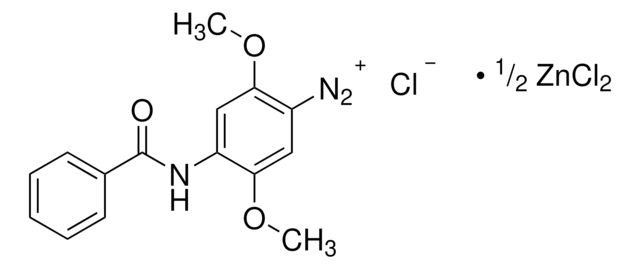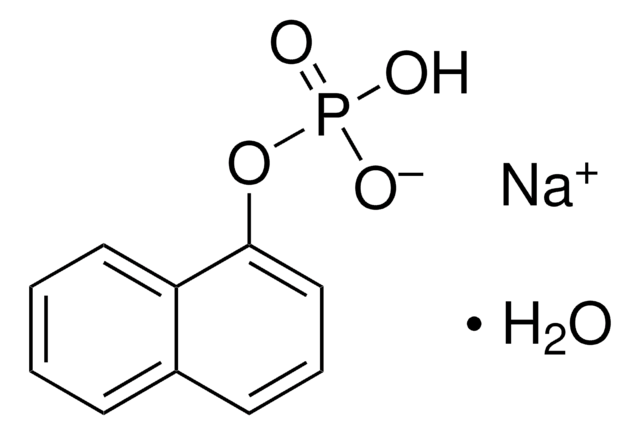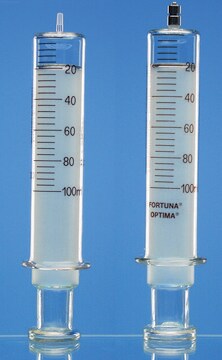17-128
Alkaline/Acid Phosphatase Assay Kit (R-R-A-pS-V-A)
Alkaline/Acid Phosphatase Assay Kit is routinely used to detect phosphatase activity by either dephosphorylation of the phosphopeptide (RRApSVA) or hydrolysis of pNPP.
Sign Into View Organizational & Contract Pricing
All Photos(1)
About This Item
UNSPSC Code:
12161503
eCl@ss:
32161000
NACRES:
NA.84
Recommended Products
Quality Level
manufacturer/tradename
Upstate®
technique(s)
activity assay: suitable (phosphatase)
detection method
colorimetric
shipped in
wet ice
Application
Used to detect/quantify: Alkaline/Acid
Packaging
Kit capacity: 100 assays
Components
Malachite Green Solution A (Cat.# 20-105)
Malachite Green Additive (Cat.# 20-104)
Phosphate Standard (Cat.# 20-103)
Serine Phosphopeptide (RRApSVA) (Cat.# 12-220)
pNPP (p-Nitrophenyl Phosphate) (Cat.# 20-106)
NiCl2, 40mM (Cat.# 20-178)
pNPP Ser/Thr Assay Buffer (Cat.# 20-179)
96-well microtiter plate
Malachite Green Additive (Cat.# 20-104)
Phosphate Standard (Cat.# 20-103)
Serine Phosphopeptide (RRApSVA) (Cat.# 12-220)
pNPP (p-Nitrophenyl Phosphate) (Cat.# 20-106)
NiCl2, 40mM (Cat.# 20-178)
pNPP Ser/Thr Assay Buffer (Cat.# 20-179)
96-well microtiter plate
Quality
routinely used to detect phosphatase activity by either dephosphorylation of the phosphopeptide (RRApSVA) or hydrolysis of pNPP
Legal Information
UPSTATE is a registered trademark of Merck KGaA, Darmstadt, Germany
Disclaimer
Unless otherwise stated in our catalog or other company documentation accompanying the product(s), our products are intended for research use only and are not to be used for any other purpose, which includes but is not limited to, unauthorized commercial uses, in vitro diagnostic uses, ex vivo or in vivo therapeutic uses or any type of consumption or application to humans or animals.
Signal Word
Danger
Hazard Statements
Precautionary Statements
Hazard Classifications
Aquatic Chronic 3 - Carc. 1A Inhalation - Met. Corr. 1 - Repr. 1B - Skin Sens. 1 - STOT RE 2
Target Organs
Lungs
Storage Class Code
6.1D - Non-combustible acute toxic Cat.3 / toxic hazardous materials or hazardous materials causing chronic effects
WGK
WGK 3
Certificates of Analysis (COA)
Search for Certificates of Analysis (COA) by entering the products Lot/Batch Number. Lot and Batch Numbers can be found on a product’s label following the words ‘Lot’ or ‘Batch’.
Already Own This Product?
Find documentation for the products that you have recently purchased in the Document Library.
Customers Also Viewed
Quantification of subnanomolar amounts of phosphate bound to seryl and threonyl residues in phosphoproteins using alkaline hydrolysis and malachite green.
Ekman, P and Jager, O
Analytical biochemistry, 214, 138-141 (1993)
An investigation of the substrate specificity of protein phosphatase 2C using synthetic peptide substrates; comparison with protein phosphatase 2A
Donella Deana, A., et al
Biochimica et Biophysica Acta, 1051, 199-202 (1990)
A Donella-Deana et al.
Biochimica et biophysica acta, 1094(1), 130-133 (1991-08-13)
The four main classes of protein phosphatases (PP-1, 2A, 2B and 2C), although differing in their ability to dephosphorylate phosphopeptide substrates, invariably display a marked preference toward phosphothreonyl peptides over their phosphoseryl counterparts. Conversely, all the acidic and alkaline phosphatases
P P Van Veldhoven et al.
Analytical biochemistry, 161(1), 45-48 (1987-02-15)
A procedure, based on the complex formation of malachite green with phosphomolybdate under acidic conditions, to measure inorganic orthophosphate in the nanomolar range is described. The addition of polyvinyl alcohol is required to stabilize the dye-phosphomolybdate complex. The advantages of
K W Harder et al.
The Biochemical journal, 298 ( Pt 2), 395-401 (1994-03-01)
The intracellular domain of human protein tyrosine phosphatase beta (HPTP beta) (44 kDa) was expressed in bacteria, purified using epitope 'tagging' immunoaffinity chromatography, and characterized with respect to kinetic profile, substrate specificity and potential modulators of enzyme activity. A chromogenic
Our team of scientists has experience in all areas of research including Life Science, Material Science, Chemical Synthesis, Chromatography, Analytical and many others.
Contact Technical Service








